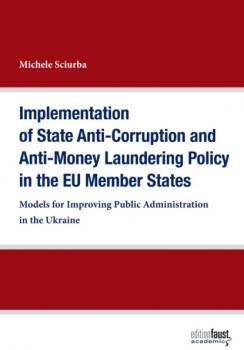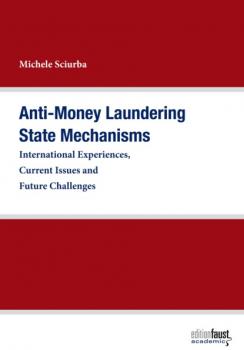Edition Faust Academic
Скачать книги из серии Edition Faust AcademicImplementation of State Anti-Corruption and Anti-Money Laundering Policy in the EU Member States
Money laundering schemes are constantly evolving, which requires public authorities to constantly up-date their knowledge and implement state-of-the-art measures to combat corruption. The monograph demonstrates how the Ukraine can improve its implementation of FATF recommendations to fight money laundering and corruption and how it can better organize the mechanisms of state regulation and the monitoring of financial activities.
This monograph offers a new approach to implementing an anti-corruption strategy in Ukraine and suggests how the fight against corruption within government can be streamlined using modern methods and a risk-based approach. Drawing on the experience of EU countries through a comparative analysis of the rules and procedures for structuring public administration policy, this work proposes developing recommendations to strengthen the Ukrainian anti-money laundering and corruption policy. Corruption remains a widespread problem at various levels within Ukrainian public administration and it has significantly weakened public confidence in government and in the judicial system. In an international comparison of corruption in 180 countries, Ukraine ranks 130th, making it one of the most corrupt countries in the world.
At the same time, Ukraine has an AML/CTF legal administrative framework in place that largely meets the current formal requirements of the FATF. The Ukraine has implemented AML and anti-corruption measures under the Council of Europe's Moneyval monitoring mechanism. In addition, Moneyval has been an associate member of the FATF since 2006. The National Bank of Ukraine (NBU) practices risk-based banking supervision and has made significant progress in creating transparency regarding the beneficial ownership of banks. In recent years, Ukraine has consistently removed criminal owners from the banking sector and established an efficient sanction regime in response to breaches of legal obligations, including the withdrawal of banking licenses. Furthermore, the establishment of a unified state register for beneficial ownership allows authorities to identify banking clients. In terms of mutual legal assistance on money laundering and corruption, the Ukraine has also made significant progress.
Ultimately, the Ukrainian AML/CTF framework has been refined significantly in recent years. Today, there is a clear understanding of money laundering and terrorist financing risks in Ukraine both at the administrative level and at the level of the supervisory authorities. As a result, far-reaching legislation has been established. Nevertheless, this development cannot hide the fact that money laundering via shell companies is still part of everyday life in Ukraine. The Ukrainian criminal justice system continues to be heavily influenced by corruption and has failed to effectively combat it. Ukrainian cross-border prosecution of money laundering offences, in particular the confiscation of proceeds of crime in other countries, is ineffective due to a lack of experience and the absence of legislation spelling out direct areas of responsibility and formal procedures. Finally, a central problem is the lack of confiscation orders which impedes the efficient prosecution of corruption and money laundering.
Anti-Money Laundering State Mechanisms
This monograph offers a comprehensive analysis of the implementation of global anti-money laundering and counter-terrorism financing (AML/CTF) regulations in the United States and the European Union. It provides academics, legal professionals and interested readers with a deep understanding of the developments of the AML/CTF legal framework and guides them into the dimension of its most difficult relation with international and European human rights law.
The implementation of global anti-money laundering regulations in the United Stated and the European Union has essentially led to the suspension of laws governing privacy and bank secrecy. Banks and other financial institutions now operate as an extension of law enforcement. The current Anti-Money Laundering regime jeopardises the fundamental achievements of the constitutional state. The increasing centralisation and cooperation of the competent authorities in the exchange of personal data information creates a security architecture that leads to a considerable risk of freedom restriction. In particular, the extension of the authorities´ power of intervention granting them access to citizens´ personal data without the need for initial suspicion underlines that a substantial part of the constitutional state is at risk. Furthermore, banks appear to use these policies as an instrument to clear legitimate but less profitable customers, in particular those with a migration background. Consequently, the implementation of the AML/CTF legal framework appears to follow a discriminatory path and clearly discloses incompatibility features with respect to the European Convention on Human Rights and Article 21 of the Charter of Fundamental Human Rights of the European Union. This monograph further explores factors contributing to the inefficiency of AML/CTF regulatory and legislative measures. Such factors are identified in inconsistent rules, which make the cooperation among national investigative authorities within the EU and at an international level more challenging. As a result, this work acknowledges regulatory and legislative harmonisation with respect to AML/CTF regimes as a central tool to successfully improve the effectiveness of AML/CTF regimes, while preserving the individual right to privacy, due process and civil rights.

